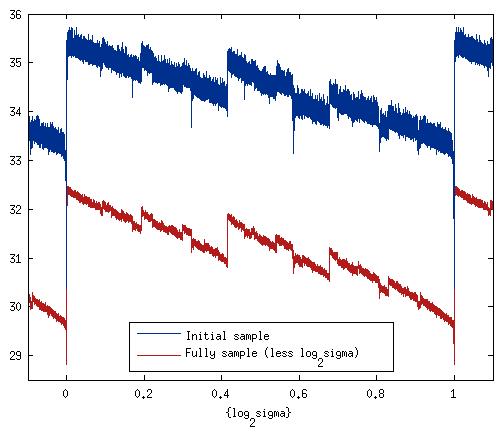|
RandomLib
1.10
|
|
RandomLib
1.10
|
The discrete normal distribution (alternate version). More...
#include <RandomLib/DiscreteNormalAlt.hpp>
Public Member Functions | |
| DiscreteNormalAlt (IntType sigma_num, IntType sigma_den=1, IntType mu_num=0, IntType mu_den=1) | |
| template<class Random > | |
| UniformInteger< IntType, bits > | operator() (Random &r) const |
The discrete normal distribution (alternate version).
Sample integers i with probability proportional to
\[ \exp\biggl[-\frac12\biggl(\frac{i-\mu}{\sigma}\biggr)^2\biggr], \]
where σ and μ are given as rationals (the ratio of two integers). The sampling is exact (provided that the random generator is ideal). The results of this class are UniformInteger objects which represent a contiguous range which is a power of 2bits. This can be narrowed down to a specific integer as follows
prints out 100 samples with σ = 7 and μ = 1/3; the samples are first given as a range and then u(r) is used to obtain a specific integer. In some applications, it might be possible to avoid sampling all the additional digits to get to a specific integer. (An example would be drawing a sample which satisfies an inequality.) This version is slower (by a factor of about 4 for bits = 1) than DiscreteNormal on a conventional computer, but may be faster when random bits are generated by a slow hardware device.
The basic algorithm is the same as for DiscreteNormal. However randomness in metered out bits random bits at a time. The algorithm uses the least random bits (and is slowest!) when bits = 1. This rationing of random bits also applies to sampling j in the expression
\[ x = x_0 + j/\sigma. \]
Rather than sampling a definite value for j, which then might be rejected, j is sampled using UniformInteger. UniformInteger uses Lumbroso's method from sampling an integer uniformly in [0, m) using at most 2 + log2m bits on average (for bits = 1). However when a UniformInteger object is first constructed it samples at most 3 bits (on average) to obtain a range for j which is power of 2. This allows the algorithm to achieve ideal scaling in the limit of large σ consuming constant + log2σ bits on average. In addition it can deliver the resuls in the form of a UniformInteger consuming a constant number of bits on average (and then about log2σ additional bits are required to convert the UniformInteger into an integer sample). The consumption of random bits (for bits = 1) is summarized here
min mean max bits for UniformInteger result 30.4 34.3 35.7 bits for integer result - log2(sigma) 28.8 31.2 32.5 toll 26.8 29.1 30.4
These results are averaged over many samples. The "min" results apply when σ is a power of 2; the "max" results apply when σ is slightly more than a power of two; the "mean" results are averaged over σ. The toll is the excess number of bits over the entropy of the distribution, which is log2(2πe)/2 + log2σ (for σ large).
The data for the first two lines in the table above are taken for the blue and red lines in the figure below where the abscissa is the fractional part of log2σ

This class uses a mutable RandomNumber objects. So a single DiscreteNormalAlt object cannot safely be used by multiple threads. In a multi-processing environment, each thread should use a thread-specific DiscreteNormalAlt object.
| IntType | the integer type to use (default int). |
Definition at line 104 of file DiscreteNormalAlt.hpp.
| RandomLib::DiscreteNormalAlt< IntType, bits >::DiscreteNormalAlt | ( | IntType | sigma_num, |
| IntType | sigma_den = 1, |
||
| IntType | mu_num = 0, |
||
| IntType | mu_den = 1 |
||
| ) |
Constructor.
| [in] | sigma_num | the numerator of σ. |
| [in] | sigma_den | the denominator of σ (default 1). |
| [in] | mu_num | the numerator of μ (default 0). |
| [in] | mu_den | the denominator of μ (default 1). |
This may throw an exception is the parameters are such that overflow is possible.
Definition at line 179 of file DiscreteNormalAlt.hpp.
References STATIC_ASSERT.
| UniformInteger< IntType, bits > RandomLib::DiscreteNormalAlt< IntType, bits >::operator() | ( | Random & | r | ) | const |
Return a sample.
| Random | the type of the random generator. |
| [in,out] | r | a random generator. |
Definition at line 230 of file DiscreteNormalAlt.hpp.
References RandomLib::UniformInteger< IntType, bits >::Add(), RandomLib::RandomCanonical< Generator >::Boolean(), RandomLib::UniformInteger< IntType, bits >::GreaterThan(), RandomLib::UniformInteger< IntType, bits >::LessThan(), and RandomLib::UniformInteger< IntType, bits >::Negate().
 1.8.6
1.8.6